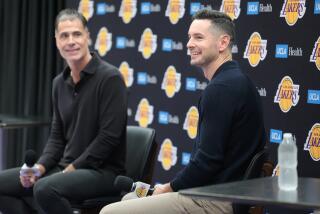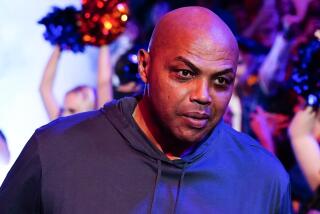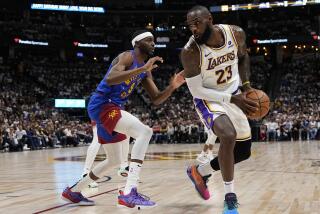NBA Owners, Players Have Common Goal: Prosperity
NEW YORK â Both sides agree that the NBA is thriving. What its players and management must decide in months of negotiations is how best to continue that prosperity.
The players, under the leadership of general counsel Larry Fleisher, believe that total freedom is the only fair way to face the future.
Commissioner David Stern, representing the 23 NBA owners, wonât discuss the leagueâs negotiating strategy directly, but itâs clear that he wants to convince the players that the status quo is their safest, and richest, bet.
âSometimes bargaining is just a matter of persuasion,â Stern said in his office at the NBAâs Manhattan headquarters. âYou close the door and talk for days or months. We have no tricks up our sleeves.â
Stern said there might be a time âwhen both sidesâ positions harden and weâll have to take a public stance, but itâs not the time now to characterize the positions other than to say they are entitled to ask for whatever they want.â
Fleisher, at the NBA Players Assn. offices a few blocks away, said the players intend to ask for plenty.
They want an elimination of the right of teams to match offers to free agents by other teams, the elimination of the 4-year-old salary cap system and the elimination of the college draft.
Fleisher said his talks with NBA players in recent months reaffirmed his determination to tackle those issues in colllective bargaining, which has already started although the current contract does not expire until the end of this seasonâs playoffs.
âThe primary issue in their minds is that the current system is unfair and unneccesary,â Fleisher said. âVirtually every player in the league for six or more years has been a free agent. With rare exceptions, they have not gotten offers from other teams. They tell me there is no such thing as free agency.â
Last year, Fleisher said, only five of the 95 free agents were tendered offer sheets by other teams.
âWe feel emphatically that the clubs have cheated on free agency,â Fleisher said.
Stern and Russ Granik, the NBAâs executive vice president, said the salary cap system, which includes a guarantee that players will get 53% of gross revenues, has greatly benefitted the players.
Gross revenues have risen from $120 million to a projected $300 million next year. The salary cap has jumped from $3.2 million to $4.3 million per team in four years.
The average player salary is up from $260,000 to $440,000 in that time, figures the players association do not dispute.
âAlthough I represent the owners and was selected by them, I work just as hard to help fans and players, especially when you consider that 53 cents of every dollar goes to the players,â Stern said.
Stern admits that his âconcern for the players is derivative. Once negotiations started, I made no pretense of representing anyone but the owners. But if we walked away with an arrangement that wasnât satisfactory to both sides, it wouldnât be a good arrangement.â
The salary cap agreement of April, 1983, came nearly a year after the previous labor contract expired and only a few days before a player-imposed strike deadline. Fleisher threatened that the players would boycott the playoffs if no agreement was reached by the deadline.
âThere was significant opposition among the owners to the salary cap,â said Stern, who had Granikâs job four years ago. âI had to sell it to them. I had a leadership role based on my own view of whatâs best for the NBA. That view isnât always the same as the owners I represent.â
Granik said, âAt some point in the negotiations, the commissioner has to go to the owners and say, âLook, the other side is being reasonable now. You have to be reasonable too, if youâre going to make a deal.â â
Several teams, because of contract commitments they made before the salary cap agreement and because they are allowed to spend any amount to retain their own free agents, still are far over the cap âlimit.â
The Lakers, for example, have a payroll of some $8 million, nearly double the current $4.3 million cap.
Changed conditions--as many as 20 of the 23 NBA teams expect to make money this season, an almost complete reversal of the situation four years ago--make for changed negotiations, Fleisher said.
âThe salary cap took effect when the league was in terrible financial shape,â Fleisher said. âNow that the situation has improved, we donât need it any more. The whole reason for putting it in was that four teams were going belly-up.
âNow there is no need for an artificial barrier. Itâs only purpose is to keep teams from paying salaries.â
âWhat are we going to do?â said San Antonio Spurs President Angelo Drossos, a member of the ownersâ labor committee. âPut it on and off as weaknesses and strengths develop? The cap has been good for the NBA. I donât think we should discuss doing away with something that has helped to create healthy franchises.â
Fleisher said the ownersâ argument that the elimination of the draft would adversely affect the leagueâs balance of power is âludicrous.â
âThe draft hasnât changed the relative power of the teams,â he said. âOnly four teams have made the NBA finals in the 1980s.â
Fleisher said the fact that the NBA is thriving and the players have prospered under the current contract is beside the point.
âItâs not a question of whether the status quo is good or bad,â Fleisher said. âThe Boston Celtics sold stock worth $50 million in a free market because thatâs what it was worth. If Larry Bird can command $5 million a year in a free market, it isnât right that he should have to accept $2 million just because it happens to be a great salary?â
Fleisher said there is some risk involved in asking for a free-market system for the players.
âIf the playersâ percentage of the gross dropped from 53% to 40%, we would just have to live with it,â Fleisher said. âWe donât negotiate individual player salaries. They get what they can.â
Fleisher said that itâs far too early--there has been only one negotiating session so far--to predict whether the two sides can settle the issues without a strike.
âWeâre serious about doing away with the the restraints on movement,â Fleisher said. âThey should be very difficult negotiations.â
âA strike is always damaging, but the NBA could survive one better than it could four years ago,â Stern said. âIf they had struck then, it could have brought the whole house down. There is nothing stopping them from continuing negotiations through next season and setting another April deadline.
âToday I consider the two parties are about equal. Itâs still a very strong union and a more stable ownership and stronger league. But we arenât thinking strike. Weâre thinking negotiation.
âWe acknowledge the inevitable--that there will be an agreement between the NBA and its players. The only question is when, after how much bargaining and hopefully with as little damage to the sport as possible.â
More to Read
All things Lakers, all the time.
Get all the Lakers news you need in Dan Woike's weekly newsletter.
You may occasionally receive promotional content from the Los Angeles Times.






